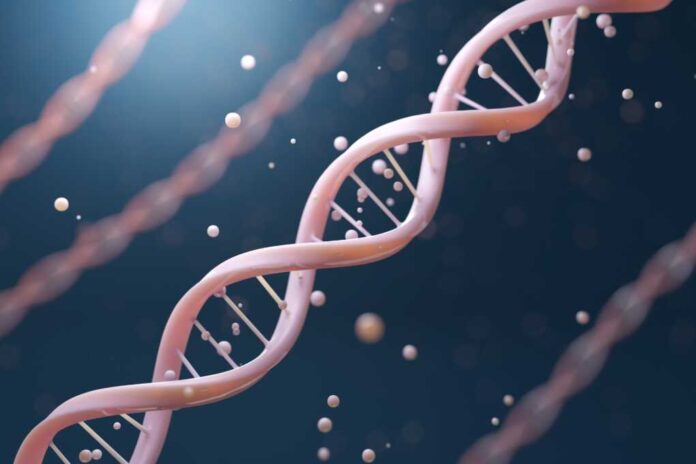
Scientists have mapped 683 genetic variants linking psychiatric disorders to brain development, potentially revolutionizing how we treat conditions like schizophrenia, depression, and autism.
At a Glance
- The PsychENCODE Consortium analyzed over 2.8 million brain cells from 2,500+ donors, identifying 46,000+ gene regulatory elements associated with psychiatric disorders
- Researchers discovered specific genetic variants that influence synaptic pruning—the elimination of neural connections—which may explain schizophrenia development during adolescence
- AI algorithms have identified over 8,000 complex DNA variants affecting brain-related genes, with 95% accuracy in detecting previously missed genetic markers
- A global study identified 293 new genetic variations linked to depression across all major populations, potentially enabling personalized treatment approaches
- 4t6y8Clinical trials using FDA-approved drugs targeting specific genetic pathways could begin within two years for certain disorders like Pitt-Hopkins Syndrome
Understanding the Genetic Architecture of Brain Disorders
The PsychENCODE Consortium represents a landmark effort to decode the genetic foundations of psychiatric disorders including schizophrenia, bipolar disorder, and autism spectrum disorder. Recently entering Phase II, researchers analyzed over 2.8 million brain cells from more than 2,500 donors, expanding their investigation to include PTSD and Alzheimer’s disease. This comprehensive approach has identified over 46,000 gene regulatory elements called enhancers and 164 variants within these enhancers that are directly associated with psychiatric disorders. The project has mapped more than 1.4 million gene regions linked to gene expression variations, creating unprecedented opportunities for predicting disease outcomes and identifying potential drug targets.
“If you want to design a treatment, it’s useful to know which cells the genes [responsible] are in and how they’re acting up to prompt the disorder,” explains Mark Gerstein, Ph.D., highlighting the practical implications of this genetic mapping for future therapeutic development. The consortium emphasizes collaboration and open data sharing, creating resources like BrainSCOPE and PsychSCREEN platforms that allow researchers worldwide to visualize and access this valuable data, accelerating discovery across the field.
Synaptic Pruning and Schizophrenia: A Genetic Connection
A breakthrough study has established a compelling genetic link between schizophrenia and excessive loss of healthy brain synapses during adolescence. Researchers identified genetic variants associated with schizophrenia risk, focusing specifically on the complement component 4 (C4) gene. Mouse studies demonstrate C4’s crucial role in synaptic pruning—the natural process of eliminating connections between neurons during brain maturation. The findings suggest that individuals with more C4 activity experience more aggressive synapse elimination, potentially explaining why schizophrenia typically manifests during late adolescence when significant neural refinement occurs.
Further research has revealed that environmental influences on schizophrenia risk are primarily active in early life, with epigenetic changes reflecting these influences. Scientists have also identified a novel human-unique protein, AS3MT-d2d3, as a significant risk factor for schizophrenia and other psychiatric disorders, highlighting the complex interplay between genetic factors and neurodevelopment.
AI Algorithms Uncovering Hidden Genetic Variants
Artificial intelligence is transforming genetic research with tools like ARC-SV, an algorithm developed to detect complex structural variants in the human genome that previous methods missed. With an impressive 95% accuracy rate, ARC-SV has identified over 8,000 complex DNA variants, many affecting brain-related genes linked to schizophrenia and bipolar disorder. The algorithm, trained on diverse human genomes, analyzes regions critical to brain function, revealing how these variants influence gene expression and psychiatric disease risk.
Similar computational approaches have enabled researchers to identify 293 new genetic variations linked to depression across all major global populations. This breakthrough allows for risk prediction across ethnicities and highlights depression’s highly polygenic nature, with multiple genetic variants contributing to overall risk. The study linked these genetic variants to specific brain neurons, particularly excitatory neurons in the hippocampus and amygdala, providing insights into brain changes associated with depression and its connections to other disorders like anxiety and Alzheimer’s disease.
From Genetic Discovery to Clinical Applications
Translating genetic discoveries into effective treatments represents the next frontier in psychiatric medicine. One promising example comes from Dr. Brady Maher’s lab, which discovered that the SCN10a sodium channel is upregulated in neurons with the TCF4 mutation in Pitt-Hopkins Syndrome. By reducing this channel’s abundance, researchers can correct abnormal neuronal activity, potentially reversing symptoms. Most encouragingly, this approach utilizes existing FDA-approved medications, accelerating the path to clinical implementation.
Researchers have also discovered that placenta health significantly affects the risk of schizophrenia and other neurodevelopmental disorders, suggesting an indirect influence on early brain development that could be targeted therapeutically. This growing body of evidence points to critical developmental windows where intervention might prevent or mitigate psychiatric disorders before symptoms emerge. As genetic maps become more detailed and mechanistic understanding deepens, clinicians may soon be able to offer personalized treatments based on an individual’s unique genetic profile, moving beyond the current symptom-based approach to psychiatric care.
Sources:
https://psychiatryonline.org/doi/10.1176/appi.pn.2024.09.9.4


















